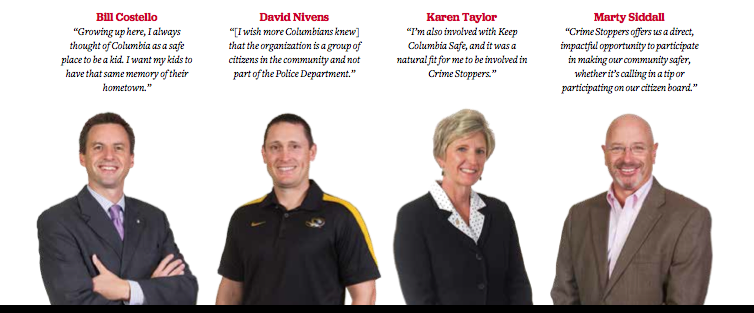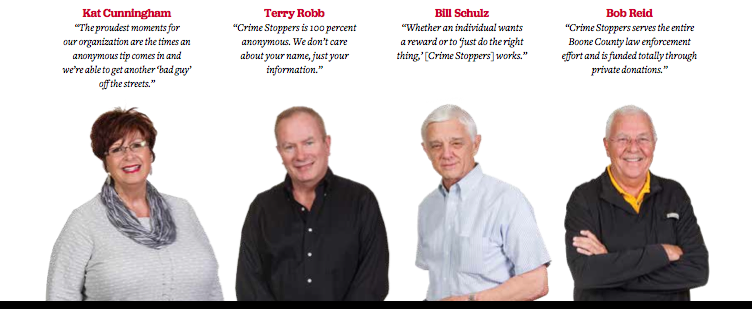Crime Stoppers fights no-snitch culture
The number 875-TIPS is written on the Columbia Police Department’s cruisers, but calling it won’t connect you to the police.
Instead, you’ll be in touch with Crime Stoppers. It’s an organization that wants your tips about Columbia’s unsolved crimes, not your personal information. Founded more than 30 years ago, Crime Stoppers promises 100 percent anonymity and isn’t part of the Police Department. It’s a not-for-profit organization that’s dedicated to solving crimes and fighting anti-snitch culture.
“We believe that with every crime committed, there’s somebody who knows something about that crime or the person who committed it,” says Bill Costello, Crime Stoppers board president.
To encourage tips, Crime Stoppers offers monetary rewards to tipsters whose information leads to an arrest. The rewards range in size but are typically between $150 and $2,000, with larger payouts for information about more severe crimes. Rewards have been larger in certain high-profile cases in which victims; families pledge additional rewards.
“It’s surprising how much people know about a crime,” Costello says. “We’re just trying to compel them to take action, guarantee their anonymity, reward them with cash and solve the crime in the process.”
Completely anonymous
Crime Stoppers doesn’t collect names, addresses or phone numbers from people who call in, and they’ll stop callers who start to share that information. Callers are assigned a tip identification number and are told to call back to find out if their tip led to an arrest.
Even the process of collecting a reward is anonymous. All it requires is a quick trip through a specific Boone County National Bank drive-thru window. The tipster gives the tip number at the bank teller window, and the money is delivered in an unmarked envelope, no questions asked.
Costello says Crime Stoppers keeps track of the number of calls the line receives and notes tip numbers to determine reward eligibility but nothing else.
“In guaranteeing anonymity, there’s really no record or log of the details of those calls,” Costello says.
Crime Stoppers board members aren’t associated with the police, but the board does learn from its law enforcement liaisons. These liaisons, which include representatives from the Columbia Police Department, Boone County Sheriff’s Department, University of Missouri Police Department and county prosecutor’s office, don’t sit on the board but do help the board identify difficult cases and publicize the cases in local media.
“Law enforcement will act on a tip, and they advise us on whether or not the tip really helped them,” says Marty Siddall, Crime Stoppers past board president and 15-year board member. “That’s where the liaisons come in.”
In three decades, there’s never been a case where a tip was challenged based on the anonymity of the informant.
Whenever the Police Department releases information about an unsolved crime, it includes a line urging anyone with information to call 875-TIPS to remain anonymous. Many media reports also include similar language.
Siddall, the general manager of KOMU 8, says he’s glad that news organizations include Crime Stoppers in their public service mission.
“We’re thankful that the media recognize Crime Stoppers as a worthwhile program in our community and provide us that goodwill in the form of public service announcements,” Siddall says. “We really rely on the kindness of concerned citizens in our community.”
In follow-up news releases announcing arrests, the Police Department sometimes notes when a Crime Stoppers tip led to the arrest, but Crime Stoppers doesn’t announce that information. All Siddall and Costello will say is that several high-profile cases have been solved with Crime Stoppers tips.
Looking ahead
After 30 years of operation, the Crime Stoppers model has changed little. Costello says the group is exploring new ways to receive tips over the Internet or via text message but first needs to make sure it will be able to guarantee anonymity over those platforms.
The notion that contacting the police constitutes “snitching” has always been a belief Crime Stoppers has had to counter. In recent years, however, Siddall and Costello say they’ve seen the community grow even more tight-lipped about crimes.
“We are really fighting the no-snitch culture,” Siddall says. “In the last four or five years, we’ve seen a trend in that regard.”
In the meantime, the group is designing an entirely new website, leveraging social media and hopes to increase its visibility around Columbia.
“We all want to see less crime in our community,” says Costello, who grew up in Columbia and is now raising his family here. “If I can serve an organization that is dedicated to solving crimes and using citizens to do that, that’s something I want to be a part of.”




